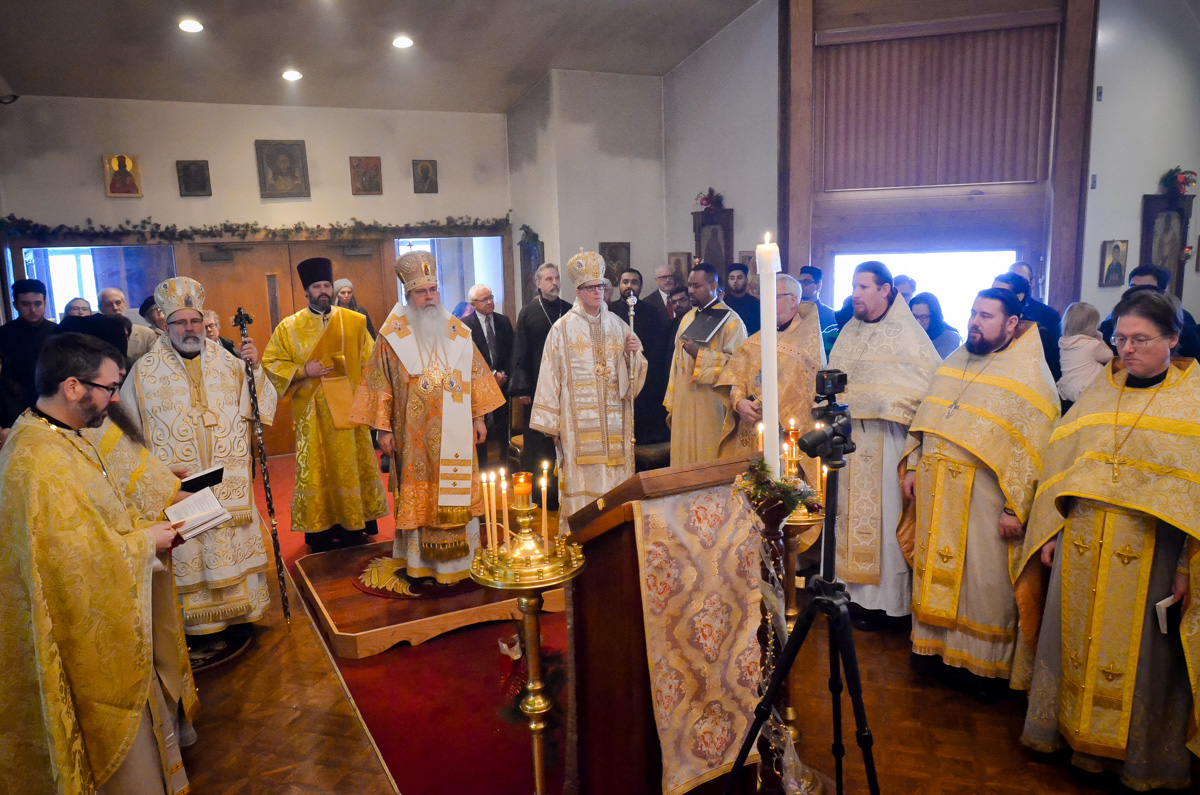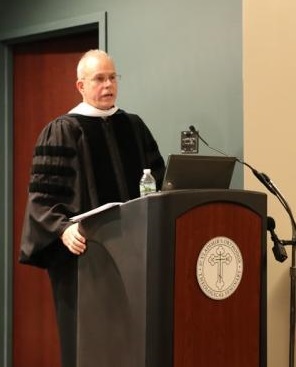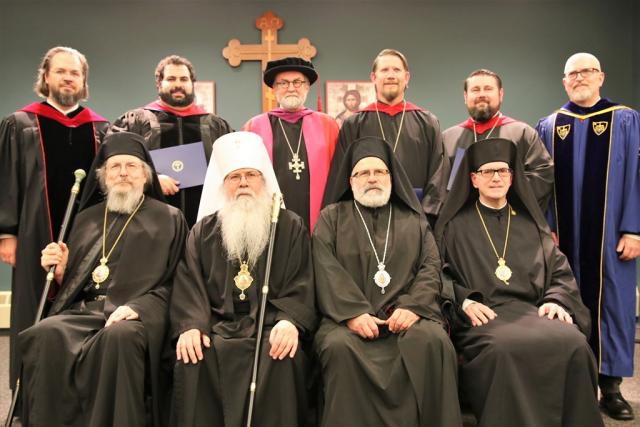Metropolitan Tikhon presides at triple celebration at St. Vladimir’s Seminary

His Beatitude, Metropolitan Tikhon presided at three major events at Saint Vladimir’s Orthodox Theological Seminary on Tuesday, January 30, 2018.
The day opened with the celebration of the Hierarchical Divine Liturgy marking the patronal feast day of the seminary’s Three Hierarchs Chapel. Metropolitan Tikhon presided, concelebrating with His Grace, Bishop John of the Antiochian Orthodox Diocese of Worcester and New England; His Grace, Bishop Anthony of the Antiochian Orthodox Diocese of Toledo and the Midwest; and seminary and guest clergy. Also in attendance was His Eminence, Archbishop Melchisedek of the Orthodox Church in America’s Archdiocese of Pittsburgh and Western Pennsylvania.
The theme of Metropolitan Tikhon’s homily centered on both a text from the Gospel for the day, “You are the light of the world” [Matthew 5], and a text from the writings of Saint Gregory the Theologian, “The mystery of godliness is for those who are willing, not for those who are overpowered.” The complete text of Metropolitan Tikhon’s homily appears below. A video of the homily also is available.

In the evening, seminary alumnus Dr. Scott Kenworthy presented the 35th Annual Father Alexander Schmemann Lecture, titled “Saint Tikhon of Moscow (1865–1925) and the Orthodox Church in North America and Revolutionary Russia.” Dr. Kenworthy’s passion for his subject was infectious, and his expertise was evident throughout his talk.
“Saint Tikhon is a particularly important and relevant saint for us,” said Dr. Kenworthy, “not only because he was one of the greatest visionaries when it came to planting Orthodoxy in North America—something he shared, of course, with Father Alexander Schmemann—but [also because he] faced all the complications of living in the modern world in religiously pluralistic environments and, of course, the most challenging of political environments imaginable.”
Dr. Kenworthy went on to describe Saint Tikhon’s pastoral responsibilities both in North America and Russia. He noted, in particular, Saint Tikhon’s unique approach to Church-state relations following the Bolshevik Revolution in Russia, and the saint’s insistence on keeping the Church out of political arguments and removed from political motivations.
Lastly, Dr. Kenworthy described the impact of Saint Tikhon’s unique personality upon the people whom he shepherded. He was a person characterized not by fame or uncommon intellect, but by simplicity, humility, kindness, and approachability—yet, he accomplished so much for the Orthodox Church in both North America and in Russia.
Dr. Kenworthy’s address offered a fitting prelude to the Mid-Year Commencement Ceremony of the Doctor of Ministry Class of 2018. Three Doctor of Ministry candidates, who began their seminary studies as part of the Cohort of 2017, earned their degrees: Priest John E. Parker III, Rector of Holy Ascension Church, Mount Pleasant, SC [OCA]; Priest Timothy Chrapko, Associate Priest of Saint Vladimir’s Ukrainian Orthodox Congregation, Calgary, AB, Canada; and Gregory Abdalah, Youth Pastor, Saint George Antiochian Orthodox Church, Phoenix, AZ. The Cohort of 2017 is the first group ever to enroll in the Doctor of Ministry program hybrid model, which includes both online courses and on-campus classroom intensives.

At the conclusion of the lecture and Commencement ceremony, Metropolitan Tikhon acknowledged the influence that Saint Tikhon’s visionary legacy continues to have on Orthodox Christianity in North America. He cited as proof the concelebration by hierarchs from the OCA and the Antiochian Orthodox Christian Archdiocese of North America that morning, together with the diverse pan-Orthodox composition of Saint Vladimir’s Seminary on all levels (e.g., student body, Board of Trustees). The text of Metropolitan Tikhon’s closing remarks also appear below.
Homily of His Beatitude, Metropolitan Tikhon
The Feast of the Three Holy Hierarchs
Three Hierarchs Chapel, Saint Vladimir’s Seminary
January 30, 2018
In the Name of the Father, and of the Son and of the Holy Spirit.
Today we celebrate the patronal feast of the holy temple of Saint Vladimir’s Seminary, which is dedicated to the Three Hierarchs and Ecumenical Teachers, Basil the Great, Gregory the Theologian and John Chrysostom. Throughout the liturgical hymns devoted to these brilliant luminaries of the Church, we are offered many flowery words praising and extolling their virtues. They are called “the depths of wisdom, the ocean currents of the Spirit, fountains ever gushing forth cascades of living water, lustrous pearls, rudders of the Church, trees bearing magnificent fruit, stewards of grace, mouthpieces of Christ, and champions of the Trinity.”
The liturgical superlatives ascribed to these pillars of the Church are almost overwhelming in their unrelenting reminder, to the rest of us mortal and fallen human beings, of the supreme perfection of life and brilliance of theology that these three exemplary saints attained. One might even be justified in thinking that it is exclusively to Saint Basil, to Saint John and to Saint Gregory that the first words of or Lord Jesus Christ in today’s Gospel reading [Matthew 5:14-19] are addressed: “Ye are the light of the world….” Their prominence in the life of the Church confirms that they indeed have been set on a lampstand for the whole world to see. And further, their light so shines before us – even today – that we never tire of beholding their good works and are thereby ourselves inspired to ceaselessly glorify our Father which is in heaven.
But, we might honestly look into our hearts and ask ourselves: are we so inspired? Are we encouraged by the lives and the teachings of the three hierarchs to change our own lives and to acquire the knowledge of God? Do we have any idea how to even begin attaining the perfection that has been commanded of us by our Lord further on in the chapter from which today’s reading is drawn, where He exhorts his disciples: “You, therefore must be perfect as your heavenly Father is perfect.” We hear these words and then we look at our own lives and might become sorrowful, fearful or even depressed about our failure to even begin to attain this perfection.
Gregory the Theologian, in speaking about pastoral direction, says: “It is our practice not to lead by force, or by compulsion, but by good will… since that which is held in by force is likely, when opportunity offers, to strike for freedom. But freedom of will more than anything else is what holds together our—I will not call it rule, but—tutorship. For the mystery of godliness belongs to those who are willing, not to those who are overpowered.”
“The mystery of godliness belongs to those who are willing, not to those who are overpowered.” How many of us have not felt overpowered and constrained by the high standards of the Gospel Commandments? “Be perfect as God is perfect!” “Be the light of the world!” “Love your enemies!” “Imitate the saints!” Living in a world where perfectionism is forced upon us, where impossible ideals of beauty and of body weight are extolled, where intellectual and artistic greatness are demanded, is it any wonder that we sometimes get discouraged when we hear the words of the Lord, when we are reminded of the supreme holiness of the saints? “The mystery of godliness belongs to those who are willing, not to those who are overpowered.” And this mystery of godliness is available to us in every age and in every circumstance.
This year we are commemorating the 100th Anniversary of the election and enthronement of Saint Tikhon as the first Patriarch of the restored Patriarchal throne of Moscow. One hundred years ago, the external circumstances of the world were different than they are today. And yet Saint Tikhon, both in his role as Primate of the Russian Orthodox Church and in his role as missionary bishop in the North American Mission, was called to shepherd his flock into the very same fold of Christ; he was called to become a saint, and to lead the faithful on that same path of sanctity; he was given the responsibility to instruct and inspire his clergy, even as he himself faced the very same challenges that they did, in their common apostolic labors.
Upon his arrival in San Francisco in 1898, Saint Tikhon made reference in a homily to the Prophet Hosea, as he announced his willingness to make his own this new people that was “not his people.” In September of 1900, Saint Tikhon referred to the same Christ when exhorting the newly ordained Priest Peter Popov to joyfully bear his cross in his future service to the Lord in Bridgeport, Connecticut. Earlier that same year, he brought to mind the words of Saint Gregory the Theologian and Saint John Climacus when exhorting the newly ordained Priest Vladimir Alexandrov of the importance of the inner discipline of prayer and cultivation of the heart. Saint Tikhon served as a true image of Christ both when exhorting the newly consecrated Bishop Raphael in February of 1904 and in ascending the Patriarchal throne in 1917, in the presence another of his co-laborers, Father Leonid Turkevich, the future Metropolitan Leonty.
And so, in today’s Gospel reading, the Lord does not say “You will be the light of the world,” as if this is only something that will take place later, at the end of time. Rather, He says “You are the light of the world.” At this very moment, and in this very place, we are all the light of the world, we are all participants in the light of the resurrection. Perhaps we don’t feel like we are participating in this light, perhaps our life is one of suffering and troubles, perhaps everything seems dark to us, rather than light. Perhaps even the Church and her teachings seem heavy for us to bear, with all the rules and regulations that we are asked to follow.
Let us therefore remember that we too have the potential to become great saints of the Church and to focus on the fact that what is required is for us to let our light so shine before men that they may see our good works and glorify our Father which is in heaven.
In the same way, we can enter into perfection, not the unhealthy perfectionism of the world, which leads to isolation and despair, but the healthy perfection of a small effort, a willingness to persevere without wavering. It is precisely the gentle, warm and clear holiness and perfection of the Three Hierarchs that teach us, not oppressively, but with peacefulness not to give in to despair when we uncover the passions within our own hearts, but to slowly weed them out one by one; not to be discouraged because we don’t seem to have control over our children and their behavior, but rather continually strive to love them and pray for them and not judge ourselves to be failures; not to be overwhelmed when we find it difficult to live in a community, whether it is our family, our seminary or our parish, but to find hope in the examples of the great saints who give expression to true community.
May this be granted to all of us, to the measure that we fulfill the commandments of our Merciful God now in this life, so that we might partake of the light of the Resurrection both now in this life and in the age to come, when we shall behold the glory of our Wondrous God, Who is worshipped in three Persons, the Father, the Son and the Holy Spirit, One light and Three lights, unto the ages of ages. Amen.
Remarks by His Beatitude, Metropolitan Tikhon
at the Conclusion of the Schmemann Lecture and Mid-Year Commencement
Saint Vladimir’s Seminary
January 30, 2018
We offer our thanks to Dr. Scott Kenworthy for offering the 35th Annual Father Alexander Schmemann Lecture on the topic of Saint Tikhon of Moscow and the Orthodox Church in North America and Revolutionary Russia. The period of time of which Dr. Kenworthy spoke so eloquently today is a significant period in the life of the Church, both in Russia and here in North America.
It is noteworthy that we are all gathered here today at Saint Vladimir’s Seminary 100 years after those significant and often tragic events, but most significantly, we are gathered here as the Church, the Body of Christ, reflecting (perhaps imperfectly), but nevertheless in a very real way, our communion with Christ and with one another.
This is, in many ways, a vivid expression of what Saint Tikhon himself worked for during his time as a missionary bishop in North America from 1898, when he first arrived in San Francisco, to 1907, when he was called back to his motherland. During those years, he established monasteries, parishes and schools, as a good pastor and leader should do.
Dr. Kentworthy mentioned the All-Russian Local Council which convened in 1917. It is certain that Saint Tikhon’s understanding of the many issues under discussion were forged by his North American experience, which perhaps was not an insignificant contribution to the work of the All-Russian Council, especially upon his enthronement as Patriarch, in the midst of the violent uprising of the October Revolution, which would see the martyrdom of his fellow laborer in the American vineyard, Father John Kochurov.
It might also be helpful to recall that, in 1917, there was also a small delegation representing the Russian Orthodox Diocese in America, among which were Archbishop Evdokim and the Archpriest Leonid Turkevich, who would go on to become Metropolitan Leonty. In the tragic events of the October Revolution, many topics under discussion at the Council became irrelevant under the circumstances. Nevertheless, some ideas, which Saint Tikhon himself had arrived at through his American experience, did survive the ravages of the Revolution. The participation of the laity in the life of the Church is one such topic.
Saint Tikhon wrote in 1905: “We must share our spiritual richness, truth, light, and joy with others who do not have these blessings. And this duty does not only lay upon the pastors and missionaries but on the lay persons as well, since the Church of Christ, according to the wise comparison of the Holy Apostle Paul, is the body, and every member takes part in the life of the body.”
This year, the Orthodox Church in America will gather for its triennial All-American Council, which is modeled after the first All-American Sobor which Saint Tikhon convened in 1907. The circumstances have changed, but Saint Tikhon would perhaps be pleased that today, we have, perhaps in a smaller and more humble way, gathered to hear the words offered to us by Dr. Kentworthy and to rejoice in our communion with one another as the Body of Christ through this gathering.
Thank you for your prayers for the new graduates of the Doctor of Ministry Program and for the continued work of St Vladimir’s Seminary.
A photo gallery is available on the OCA web site and Facebook page. An additional gallery is available on the seminary website. A video of Metropolitan Tikhon’s remarks at the conclusion of the lecture and Commencement also is available.
